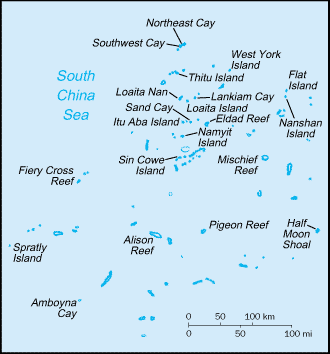In a ruling that’s likely to expand acrimony in the area, an international tribunal in the Hague ruled against China today, insisting they have no historic claims on the South China Sea, and that much of their claimed maritime sovereignty does not exist.
 China had boycotted the hearings, which were pushed by the Philippines over several conflicting claims around the sea, including fishing rights in some areas and planned offshore drilling schemes. The Philippines, which won on materially every point, was needless to say cheering the ruling.
China had boycotted the hearings, which were pushed by the Philippines over several conflicting claims around the sea, including fishing rights in some areas and planned offshore drilling schemes. The Philippines, which won on materially every point, was needless to say cheering the ruling.
China has claimed 90% of the South China Sea, citing historic Chinese control over the area. The US has complained that the area has too much shipping traffic to be allowed to remain in Chinese hands, though China has made no attempts to interfere with commercial shipping.
As was the US, which historically has backed every one of half a dozen conflicting claims in the South China Sea, so long as those claims cross into claimed Chinese territory. The US was in particular keen on rulings that saw China’s islands in the Spratly chain redefined as not legally islands, so that China can’t extend sovereignty around them.
Vietnam, another nation that has considerable territorial disputes in the sea, and fought a brief, losing war with China over the matter, also cheered the ruling, and is expected to be among the first to line up for their own tribunal case, hoping to get similar rulings in their favor.
With China not attending the hearings in the first place, it isn’t clear if this will actually mean anything in practice, as the tribunal’s ruling did not come with any orders for China to abandon any of the contested islands. Speculation that China might be punished for not abiding by the ruling may be premature given the lack of tribunal demands for China to do anything.
Taiwan, which theoretically claims all of the same territory as China, also slammed the ruling, saying it “significantly” impairs their territorial claims. This isn’t just hypothetical for them, either, as Taiwan had long argued that Itu Aba, their only actually held island in the South China Sea, amounts to the only “real” island in the South China Sea, and entitled to a 200 nautical mile economic zone. The Philippines had argued that no Spratly islands were real, and that would include Itu Aba.
The question of which islands are proper islands and which aren’t ultimately means the difference between a 200 nautical mile zone and a 3.5 mile zone. The tribunal found that no island incapable of sustaining a fully independent human community and “independent economic life” are real islands. Though there are people on several of the islands, none constitute what the tribunal would consider a community, and subsequently no “islands” can exist.


